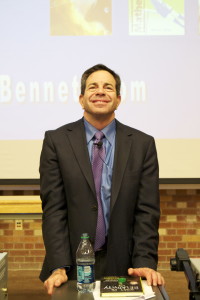 |
| Jeffery Bennett spoke about his book “What is Relativity?” at the meeting of the Seattle Astronomical Society in April. Photo: Greg Scheiderer. |
Bennett noted that a key idea of relativity is that it is motion that is relative. He illustrated this by talking about a plane flight between Nairobi and Quito, two cities on Earth’s equator. The plane leaves Nairobi, flies at 1,670 kilometers per hour, which happens to be the Earth’s rotational speed at the equator, and then lands in Quito.
A person standing on Earth would say the plane flew west at 1,670 kilometers per hour. However, a person watching this flight from the Moon would have seen the plane take off, hover while the Earth spun under it, and then land once Quito arrived. That person would peg the plane’s speed at zero. Who is right?
“Einstein’s answer is both are correct,” Bennett said, “and neither one makes sense unless you specify what you’re measuring your motion relative to.”
Absolutes are key in relativity
Bennett explained that the heart of relativity is not what is relative, but the two things that are absolute: the laws of nature and the speed of light. He used an airplane flight to illustrate the latter point as well.If you’re in a plane going 500 miles an hour, and you throw a ball forward at 10 miles per hour, a person on the ground would see that ball going at 510 miles per hour—the speed of the plane plus the speed of the ball. However, if you shined a flashlight forward, the light would go at the speed of light, not light-plus-500. The motion of the plane does not effect the speed of light.
“It is not effected by motion of either the observer or the source,” Bennett explained. “It’s an experimentally measured fact that the speed of light is the same for everyone, and from this single fact, if you do thought experiments, you can derive all the seemingly strange consequences of relativity.”
Not so fast!
The book is loaded with such thought experiments that help one get a grasp on the concepts. One Bennett talked about at length is the impossibility of exceeding the speed of light. Imagine a spaceship with theoretically unlimited speed. If Bennett, as the pilot, turns on the ship’s headlights, both he and an observer outside the craft would see the light from the headlights moving ahead of the ship at the speed of light.“This is not a challenge to be broken technologically,” he continued. “It’s something that simply cannot be done. In fact, the idea that you cannot go faster than the speed of light is so well established that not even science fiction writers try to break it. That’s why they go through wormholes or into hyperspace or make warp drive to bend spacetime, because science fiction writers know you cannot travel through the universe at a speed greater than the speed of light. It simply can’t be done because the speed of light is the same for everyone.”
Bennett explained that the predictions of the effects of relativity have been tested exhaustively, and much of what we see in our everyday lives serves as proof that it works.
“The sun shining is evidence that relativity is correct,” he said. “Every time you turn on a computer or a light our a cell phone you’re testing the theory of relativity and showing that it works. This is an extremely well-established idea.”
Uncommon sense
Bennett speaks about relativity often and finds that many people have a hard time with it because they feel it violates their common sense.“The good news is it actually doesn’t violate your common sense,” Bennett said. “The bad news is the reason it doesn’t violate your common sense is because when it comes to these ideas, you just don’t have any common sense.”
Why not? Common sense, by definition, derives from everyday experiences.
“These effects of relativity become noticeable when you’re traveling at speeds close to the speed of light. And guess what? You’ve never done that,” Bennett said.
Gravity
When it comes to gravity, Newton had the math pretty well figured out, but even he thought the notion of one massive body acting somehow on another had sort of a weird, magical quality. Einstein came along and figured out that gravity is simply curvature of spacetime.“This is one of the fundamental ideas of general relativity,” Bennett said. “Gravity is no longer a magical force at a distance, it’s just objects following the natural contours of spacetime as they are shaped by masses in the universe.”
Evidence that this is true includes gravitational lensing, gravitational time dilation, black holes, and gravitational waves. The first has been seen, the second measured, and we’ve seen the effects of the third. Bennett said scientists are optimistic they’ll actually detect gravitational waves in experiments this year.
Why relativity matters
Bennett feels that scientific knowledge, understanding of reality, and the inspiring human potential to do great things through science are among the reasons that relativity matters. A fourth reason is highly philosophical.“In a sense, every action you ever take is a permanent part of spacetime,” he said. “Your life is a series of events, and this means that when you put them all together you are creating your own indelible mark on the universe. Perhaps if everyone understood that, we might all be a little more careful to make sure that the mark we leave is one that we are proud of. This may be a little naive, but I actually believe that if everyone understood the theory of relativity we’d all treat each other a little bit better.”
What Is Relativity?

No comments:
Post a Comment